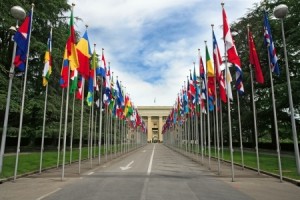 The United Nations (UN) is an organisation whose main purpose is to see to it that international laws are binding in order to ensure global peace, stability and development. The United Nations was officially formed in the year 1945 during the drafting of the Charter of the United Nations in San Francisco, California at the Conference on International Organisation even though the name United Nations had been in existence since the year 1942, Winston Churchill and Franklin D. Roosevelt came up with that name at the Declaration of the United Nations after the second world war which was fought in 1939. On the 24th of October, 1945 the United Nations was officially launched with 50 member countries as at that time.
The United Nations (UN) is an organisation whose main purpose is to see to it that international laws are binding in order to ensure global peace, stability and development. The United Nations was officially formed in the year 1945 during the drafting of the Charter of the United Nations in San Francisco, California at the Conference on International Organisation even though the name United Nations had been in existence since the year 1942, Winston Churchill and Franklin D. Roosevelt came up with that name at the Declaration of the United Nations after the second world war which was fought in 1939. On the 24th of October, 1945 the United Nations was officially launched with 50 member countries as at that time.
The United Nations is an organisation that came to replace the League of Nations which was formed in the year 1919 with a total number of 58 member countries. After some time, the League of Nations was seen as not being very effective and efficient in ensuring global stability, peace and development as its inability to deal with certain problems led to the start of WWII. The United Nations was therefore formed to help restore order and ensure that international laws are properly enforced. The United Nations now has a total of 193 member countries and boasts of so many humanitarian acts which has made it the organisation that is regarded by all as being able to help achieve a peaceful and sustainable environment for all.
In ensuring that the world is made a better place for all to live in, the United Nations performs some very vital functions. These functions include peace and security, development, human rights, humanitarian affairs and international law. By successfully performing the above mentioned functions, the United Nations makes the goal of having a very safe world for all very achievable.
Peace and Security
In trying to ensure peace and security within all its member countries, the United Nations from time to time do send peacekeepers to war torn areas within member states even though it does not have its own peacekeeping forces. However, with the consent of all member countries trained peacekeeping forces are sent on peacekeeping missions by the United Nations when the need arises. These peacekeepers are sent to restore law and order to conflict ridden regions and it was through such acts of valour that the Noble Peace Prize was awarded to the peacekeeping force of the United Nations.
Development
With regards to development, the United Nations plays a role that is second to none through its own organ known as the United Nations Development Programme (UNDP). They provide member countries with the needed requisite expertise and assistance to help them develop. Other developmental bodies found within the United Nations through which member countries are supported in terms of development include the UNAIDS, the United Nations Population Fund among other notable ones. All these organisations come together to help member countries chart the right developmental course through the provision of grants and technical knowledge by the United Nations.
Human Rights
One main area that the United Nations has never neglected is that of human rights protection. The United Nations seeks to ensure that the rights of all citizens within its member countries are protected and not trampled upon by any individual or organisation. The seriousness with which the United Nations ensures that citizen’s rights are protected can be seen by the adoption of the Universal Declaration of Human Rights which was made in the year 1948. This declaration ensures that a common basis is set for all things related to human rights in all member countries.
Humanitarian Affairs
The United Nations also sees to the training of personnel to handle various forms of unforeseen emergencies like the Ebola Virus Disease outbreak in some West African Countries and the Malawi floods. It also sees to the provision of other vital human support needs like food, water, shelter and medicine to regions that have been hit by either natural disasters or wars.
International Law
International Law is the bedrock of the United Nations as it seeks to have a universal law that will bind all member countries and ensure that each country abides by the dictates of the law. Some of these international laws that bind all member countries include the environmental law, international criminal courts, international trade law, war crimes, law of the sea and other notable ones.

